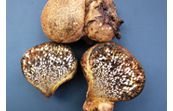Cost of inoculating seedlings with Pisolithus tinctorius spores
DOI:
https://doi.org/10.21750/REFOR.5.06.52Abstract
Although the production of commercial products of vegetative Pt (Pisolithus tinctorius (Pers.) Coker & Couch) inoculums has ceased in North America due to a lack of demand by consumers, the number of products that contain Pt spores has increased. The quality, quantity and price of these products vary considerably. The cost of inoculating 1,000 tree seedlings with Pt basidiospores can vary from $0.45 to more than $30. The cost of treating with Pt spores is lowest when seedlings are inoculated in a container nursery using rates that are less than 0.4 mg per seedling. However, with some products the cost to treat 1,000 bareroot seedlings is greater than $500 when spores are applied in the planting hole. Three decades ago, 1 g of Pt spores could be purchased for $0.13 and now the price of 1 g can exceed $14. Although many research papers provide data on the biological response to inoculating seedlings with spores, few document the cost of inoculation. Commercial products that are marketed toward homeowners containing both ectomycorrhizal and endomycorrhizal spores are more expensive than products that contain only ectomycorrhizal spores. In situations where survival and growth of seedlings are not increased, the benefit/cost ratio will typically be less than one.
Downloads

Downloads
Published
Issue
Section
License
Authors who publish with this journal agree to the following terms:
- Authors retain copyright and grant the journal right of first publication with the work simultaneously licensed under a Creative Commons Attribution License CCBY that allows others to share the work with an acknowledgement of the work's authorship and initial publication in this journal.
- Authors are able to enter into separate, additional contractual arrangements for the non-exclusive distribution of the journal's published version of the work (e.g., post it to an institutional repository or publish it in a book), with an acknowledgement of its initial publication in this journal.
- Authors are permitted and encouraged to post their work online (e.g., in institutional repositories or on their website) prior to and during the submission process, as it can lead to productive exchanges, as well as earlier and greater citation of published work (See The Effect of Open Access).



